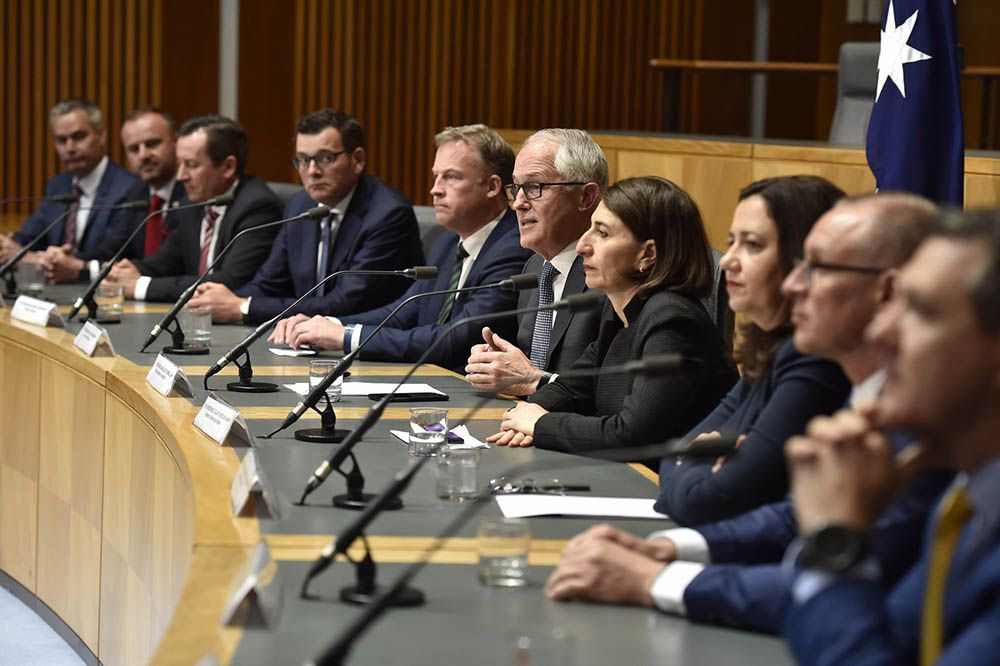Hitting the sweet spot: public safety, national security and civil liberties
Posted By Isaac Kfir on October 13, 2017 @ 11:02

The 5 October special meeting of the Council of Australian Governments focused [1] on security and counterterrorism. Premiers and chief ministers agreed to establish the National Facial Biometric Matching Capability and signed the Intergovernmental Agreement on Identity Matching Services. They discussed new criminal offences for terrorism and allowing police to detain people for 14 days without charge [2], which is currently possible only in New South Wales.
At the heart of what COAG was seeking to do was harmonise databases and make it easier and quicker for state and federal police to access them. Currently, it can take up to a week to identify people across the system; in terrorism cases, where time is of the essence, that could be too long.
In the US, the 9/11 Commission underlined how fragmented the US intelligence and security establishment had become. That led to the establishment of a cabinet-level post to oversee the different security agencies: the director of national intelligence. It also led to the creation of the Department of Homeland Security (DHS), which brought 22 executive-branch agencies, such as Customs, the Immigration and Naturalization Service, the Coast Guard and the Secret Service, under a single department. President Bush’s goal in establishing DHS was to improve efficiency and coordination.
One reason for the consolidation was that two of the 9/11 hijackers had been on a Federal Aviation Administration watch list, which wasn’t shared with the FBI: the two government agencies were debating [3] which organisation’s letterhead should be on a new list that they were both working on.
In the current threat environment, there are legitimate reasons for new security measures in Australia; as Prime Minister Turnbull said, national security isn’t something you can ‘set and forget’. Justice Minister Michael Keenan pointed out [4] that the current information-sharing system is antiquated and ill suited to dealing with contemporary threats.
But there’s also a need to consider some of the civil liberties implications of these measures.
The 9/11 terrorist attack and its aftermath have prompted governments to adopt counterterrorism legislation that at times challenges core democratic values, such as by suspending habeas corpus, allowing the use of ‘enhanced’ physical interrogation techniques, and establishing military tribunals.
There’s often no sunset clause in these legal and policy measures: they become permanent.
In 2015, following the Paris attacks in which 130 people died, the French government declared a state of emergency. Some of the emergency powers have now being normalised [5] under a new counterterrorism bill. For example, police have the authority to detain [6] people without search warrants, declare public spaces as secure zones (which can lead to the prohibition of large gatherings) and temporarily close places of worship.
However, those provisions were debated [7] in the National Assembly, and a core promise of Emanuel Macron as he ran for the presidency was to introduce more effective counterterrorism measures while protecting French citizens’ liberties.
We’re living in a new era when it comes to security, as threats from non-state actors have drastically changed our lives. Before 9/11, who would have thought that civilian airliners could become bombs, or that explosives could be synthesised in flight from components brought on board by passengers?
Western governments now need to engage more openly with civil society on stricter security measures, while also encouraging security professionals to interact with the public at large.
In the US, Congress regularly holds open and closed hearings in which legislators speak with the heads of the CIA, FBI and NSC, and US intelligence leaders give media interviews. Those forums give the public a chance to hear from the professionals about the threat spectrum, and allow security professionals to defend proposed new measures. It’s not just about politicians dominating the conversion.
Greater transparency on new security measures is needed: many of the newer measures that are being rolled out here and in other Western nations are invasive and expensive.
In the US, for instance, it’s estimated [8] that since 9/11 the country has spent around $1 trillion on security, of which around $500 billion [9] was on intelligence, on defending the home front from terrorism, and on radically revising the intelligence and security architecture.
Over time, a shift has taken place in the DHS psyche: when it comes to countering terrorism, there’s real value in resilience programs and programs that call for public awareness (‘If you see something, say something [10]’).
Americans have come to embrace the idea that an effective way to deal with terrorism is to refuse to be terrorised when acts of terror take place. DHS has looked to places such as Israel and the UK where resilience is high. And it has also recognised that threats to the homeland come in different shapes and forms, from climate change to domestic right-wing terrorism to the compromising of critical infrastructure.
Governments spend an enormous amount of money and time looking for the best system to ensure our democracy, the rule of law, our core values and our way of life, but they spend little political capital when introducing legislation that will have profound impacts on our daily lives.
Our policymakers should mount the soapbox more often and engage the public on the need for stronger security measures. They should be encouraging senior national security officials to make the case for change.
Persuade us that we need these stronger measures. As Atifete Jahjaga, Kosovo’s president, observed [11], ‘When there is debate, there are solutions.’
Article printed from The Strategist: https://www.aspistrategist.org.au
URL to article: https://www.aspistrategist.org.au/hitting-the-sweet-spot-public-safety-national-security-and-civil-liberties/
URLs in this post:
[1] focused: https://www.coag.gov.au/sites/default/files/communique/special-communique-20171005.pdf
[2] 14 days without charge: https://www.theguardian.com/australia-news/2017/oct/05/turnbull-denies-new-facial-recognition-measures-amount-to-mass-surveillance
[3] debating: https://www.theatlantic.com/magazine/archive/2016/09/are-we-any-safer/492761/
[4] pointed out: http://www.abc.net.au/news/2017-10-04/pm-calls-for-national-database-of-drivers-licence-photos/9014098
[5] normalised: https://www.theguardian.com/world/2017/sep/28/macrons-counter-terror-bill-risks-frances-human-rights-record-says-un
[6] detain: https://euobserver.com/justice/139277
[7] debated: https://www.theatlantic.com/international/archive/2017/07/will-frances-state-of-emergency-become-permanent/532848/
[8] estimated: http://www.relooney.com/NS3040/000_New_1400.pdf
[9] $500 billion: http://www.pewresearch.org/fact-tank/2013/09/11/u-s-spends-over-16-billion-annually-on-counter-terrorism/
[10] If you see something, say something: https://www.dhs.gov/see-something-say-something
[11] observed: http://thehill.com/policy/international/232703-kosovar-president-atifete-jahjaga-the-four-key-ingredients-for-peace
Click here to print.